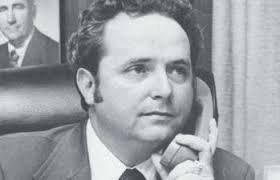Roy C. Nixon, better known to his friends by his nickname, Skip, was the first Shelby County mayor and he too often – and unjustly – is treated as a footnote in the history of county government.
He died Sunday at the age of 85.
I first met him when I was a young reporter for the Memphis Press-Scimitar assigned to cover the sheriff’s office and the criminal justice system. It was 1972 and his affable approach and his ready humor made him a great character in so many news stories at the time, and even when the coverage was negative, he held no grudges and engaged in no whining or griping. He simply loved the job too much for that.
When voters decided at referendum in 1974 that the cumbersome administrative structure of Shelby County Government – duties were blurred between the three-headed commissioners and the County Court chairman – had to be streamlined, he entered in the race to be the first county mayor for the newly restructured government.
It was 12 years after the landmark Baker v. Carr Supreme Court ruling that established the “one man-one vote” principle and required redistricting of the Shelby County legislative body (as well as every legislative body in the entire U.S.). Until that ruling, although the majority of Shelby County’s population lived inside Memphis, the majority of the county’s legislative body’s members were from outside Memphis to the point that each town had their own member. Despite the Supreme Court ruling, county government continued to maintain its suburban focus, but after taking office, Mr. Nixon set out to bring more balance to the county’s services.
Setting The Firm Foundation
The new law set out the new structure but there was room for disagreement about how the mayor would function within in. From the beginning, Mayor Nixon said that he was intent on creating a “strong mayor” form of government and an office that would stand on equal footing with his counterpart in the City of Memphis.
He understood that he would set the standard for future mayors, and because of it, he strongly resisted any blurring between the lines between legislative and administrative powers and duties. If the county mayor was to be a so-called “strong mayor,” he often said he had to fight to make that happen.
After covering him as a reporter, a few months after he took office, he offered me a job in the mayor’s office and I refused. I dearly loved journalism, but the birth of a second daughter made that love suddenly secondary to the need for a better salary.
When he asked again, I took the job, but only after I told him that he needed to know that I hadn’t voted for him. In classic form, he laughed and slapped me on the back. “I don’t care who you voted for,” he said. “I care that I need you.”
Touching the Future
It was not always a smooth ride as Shelby County Government transitioned from a good old boy, rural-oriented government into the modern government envisioned in the restructure law, but his “hail fellow well met” approach to life brought supporters to his points of view and because of it, in 1978, when he decided not to run for reelection and turned over the office to Bill Morris, who had been sheriff when he had been chief deputy, the mayor’s position was firmly set as the leader of county government.
Although Mayor Nixon was in office only a few months shy of three years, it is easy for me to point to one key decision of his that touched the future – his attitude toward the 4,500 acres at the Shelby County Penal Farm. Because of him, for the first time, we could envision the expansive land as a park.
To quote from the history that I wrote for the book, Shelby Farms Park: Elevating a City:
With $50,000 donated by Abe Plough, well-known San Francisco landscape architect Garrett Eckbo was hired to consider the future of the land, and the title of his 1975 report said it all: “Shelby Farms Public Use Program.” Forevermore known as the Eckbo Plan, the report said unequivocably that the land’s future should be as a 3,500 acre regional park with “compatible facilities.”
And yet, there was still no roadmap for getting there, a fact acknowledged by Eckbo: “There may be some feeling of disappointment that this is not a ‘final’ plan…there are decisions left to be made.”
The Eckbo Plan had ended the debate about whether the Penal Farm should be sold or developed, but the question of how to create a “regional park” remained to be answered. The quest to answer that question is the third chapter of the land’s history, and a major step forward came with the restructure of Shelby County Government and the 1976 election of its first mayor, Roy Nixon.
Weary from years of controversy, some county officials suggested that Shelby County Government give the land to City of Memphis, but Nixon refused to hear of it. He appointed Tommy Hill, former policeman, state trooper, and chief of the Shelby County Sheriff’s Department Reserve Deputies, as superintendent of the Shelby County Penal Farm, and it began a relationship that was pivotal to the park’s history.
On a perfect spring day in 1976, Hill was hiking the Penal Farm’s 4,500 acres to familiarize himself with his new responsibilities. Wildflowers were peeking out of the pasture grasses, trees were leafing out and beginning to bud, and the landscape was at its bucolic best. Drawn to the large pine forest south of Mullins Station Road and east of Farm Road and two 14-acre lakes nearby, Hill had an epiphany: “The beauty of the lakes and the about 400 acres surrounding them astounded me, and since the land was no longer being used for farm production, my thoughts were that the area should be opened to the public as a park.”
Nixon gave him the go-ahead, and little more than a year after Hill’s hike, 333-acre Plough Park opened, named in honor of the benefactor who had played a key role in protecting the land. Any question about the public’s interest in a park was answered emphatically with a rush of visitors.
A Foxhole Kind of Friend
After leaving the mayor’s office, Mr. Nixon would go on to work as a state official and move to Middle Tennessee before returning a few years ago to live in Collierville.
While there are many stories that illuminate who he was, what defined him for me was that if you were in a foxhole, he was the person you wanted to be there with you. You never had to look to make sure he was still with you. He never forgot a friend. He never made a politically expedient decision when a friend needed help, even if he hadn’t spoken with him for many years. He was the embodiment of the word, loyal.
In this way, he represented the best kind of politician, some say old-style politician, and that may have the ring of truth considering how much expediency, one-upmanship, and ego drive so much political theater today.
Everyone who knew him will have their own special story of this special man to tell, but this is mine.
He is survived by his wife, Betts, three daughters, two step-sons, 13 grandchildren, and 12 great-grandchildren. Services are Saturday, June 8, at 11 a.m. at S. Patrick Presbyterian Church, 710 W. White Road, Collierville.
***
Join us at the Smart City Memphis Facebook page for daily articles, reports, and commentaries relevant to Memphis.



